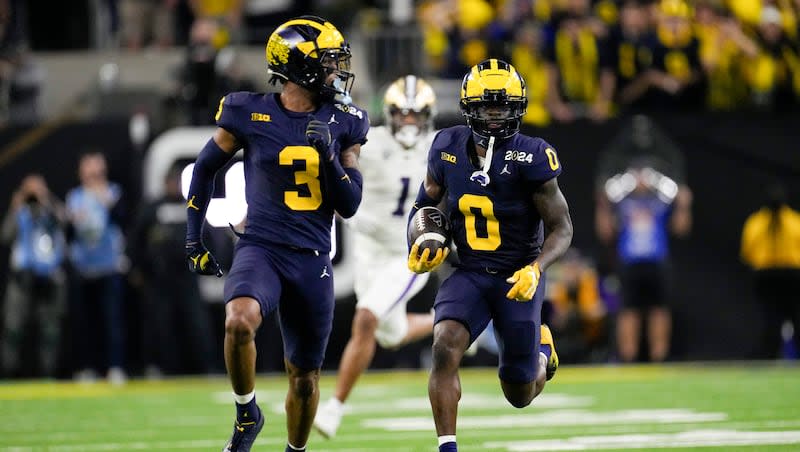Reports: 12-team College Football Playoff won’t be around for very long

For years, college football fans have awaited the arrival of a 12-team College Football Playoff — a postseason for college football that could approximate the postseasons of the NFL, NBA and Major League Baseball and do away with the uncertainty about whether the best team actually is crowned national champion on a year-to-year basis.
That 12-team playoff is on its way, beginning this season. But it won’t be here for very long. According to multiple reports Thursday, the 12-team College Football Playoff is not long for this world. In fact, come Friday, its fate will be sealed, the 12-team playoff existing for only two years.
That is because the nine FBS conferences (ACC, Big Ten, Big 12, SEC, MW, AAC, Sun Belt, Conference USA and MAC), plus Notre Dame, are expected to sign a contract with the CFP for a 14-team playoff starting in 2026.
Per ESPN’s Heather Dinich, “Each league and Notre Dame are expected to sign a legal agreement by midday on Friday. It’s a memorandum of understanding that lays out broad terms of what the next contract will look like.”
That next contract, per Yahoo Sports’ Ross Dellenger, is likely to include unequal revenue sharing. Namely, the “Big Ten and SEC would combine to earn about 58% of the CFP’s base distribution. The figure would greatly exceed the ACC and Big 12′s combined distribution number, which is expected to be around 32%. The remaining amount (roughly 10%) will be distributed to Notre Dame and the 64 Group of Five teams,” Dellenger writes.
Moreover, the format of a 14-team playoff could include guaranteed bids for multiple teams from both the Big Ten and SEC, the clear powers in college football going forward, though that won’t be finalized until a new television deal with ESPN is agreed to, ESPN’s Pete Thamel reported.
According to Thamel, “Starting in 2026, ESPN is poised to spend an average of nearly $1.3 billion on the playoff for six seasons. The deal would include the final two years on the current CFP contract, plus a new six-year agreement for the next iteration of the playoff.”
The format that appears to have the most support going forward is a 5-plus-9 model, meaning five automatic berths to conference champions (ACC, Big Ten, Big 12 SEC and highest ranked Group of Five), plus nine at large bids.
However, Dellenger reports that there are multiple formats that have engendered discussion, including a 3-3-2-2-1-plus-3 model, which would grant “three automatic qualifiers each to the SEC and Big Ten, two each to the ACC and Big 12 and one to the highest-ranked Group of Five program.”
There is also a 2-2-1-1-1-plus-7 model, which would guarantee “two auto berths each to the SEC and Big Ten, one each to the ACC and Big 12, one to the highest-ranked Group of Five, with seven at-large spots,” Dellenger writes.
Whatever the format, “the new agreement will codify the further financial separation of the expanded Big Ten and SEC from everyone else in college athletics,” Thamel writes.
As for why Group of Five leagues would agree to terms that would only enlarge the gap between them and the Power leagues, an unnamed Group of Five athletic director told ESPN, “It’s like the Godfather’s offer you can’t refuse.”
Or as Thamel put it, “They (Group of Five conferences) won’t choose being excluded from the CFP.”
Dellenger reported that the format of the 14-team CFP will ultimately be determined by the SEC and Big Ten, with consultation from ESPN, the ACC and Big 12, adding that the format is expected to be decided upon this week.
All of which is to say, enjoy the 12-team playoff while its here. Because it won’t be around for very long.

